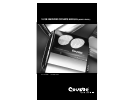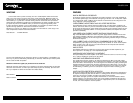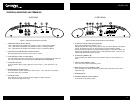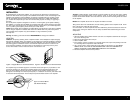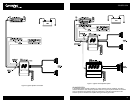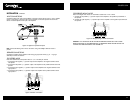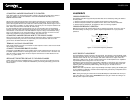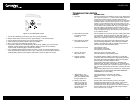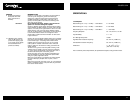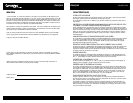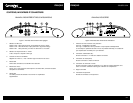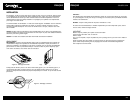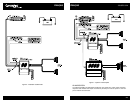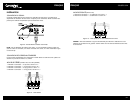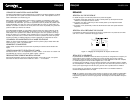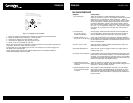
COUSTIC.COM
17
SPECIFICATIONS:
161SE Amplifier
Rated Power @ 14.4 V (0.1 % THD): 4 Ohm Stereo 2 x 40 Watts
Rated Power @ 14.4 V (0.1 % THD): 2 Ohm Stereo 2 x 80 Watts
Rated Power @ 14.4 V (0.2 % THD): 4 Ohm Mono 1 x 160 Watts
Frequency Response: 20 – 20,000 Hz ± 0.5 dB
Input Sensitivity: 0.1 – 5 V
S/N Ratio @ rated power: 100dB
High-Pass Filter Crossover Frequency: 80/120 Hz (18dB/Oct.)
Low-Pass Filter Crossover Frequency: 80/120 Hz (18dB/Oct.)
Dimensions: 11" W X 2
3
⁄8" X 7
1
⁄4" L
(280 X 60 X 185 mm)
Due to continual product improvement, all specifications subject to change without notice.
SYMPTOM PROBABLE CAUSE
9. Constant level whining Check for a ground loop in the system. Turn the system off
noise (most noise with and one by one change the ground connections (by
source unit volume at changing to a different contact point,scraping the level
minimum) constant irrespective of metal clean of all paint, rust or
grease). Turn the system on and check for whining noise
after each ground change.
CAUTION: Do not disconnect the Power Amplifier's ground when the
system is on. This could damage the amplifier.
Check for defective signal cables. Disconnect signal cables
at the amplifier and listen carefully for noise. If the noise dis-
appears, run a test pair of signal cables. If there is no unde-
sirable whining noise, reconnect to the amplifier with the
new pair of signal cables. Check battery ground connection
to the vehicle chassis to make sure it is tight and clean.
Check battery negative terminal connection to make sure it
is tight and clean.
10. Radiated noise: crackling Check if the noise is actually radiated noise: Tune a portable
noise on FM which is not radio to the same FM station. Move the portable radio close
present when playing tape to the vehicle engine. If crackling noise comes from the
or CD (noise varying slightly
portable radio, then the noise you have in your vehicle
with accelerator but is audio system is radiated noise.Check with a VOM (volt
present at all times) meter) to make sure the antenna is really grounded to the
vehicle chassis.
To ensure a true ground, break the plastic covering of the
antenna lead and solder a piece of heavy wire (minimum
14 gauge) to the braided shield. Ground the other end of
the wire at the same point as the radio ground.
Check spark plug wires. They should be suppression-type
wire and less than 2 years old. Otherwise, replace them
with good quality suppression cables.
Make sure engine block is grounded to the vehicle chassis
at a bare metal spot (scraped clean of paint, rust and
grease).
Make sure hood is also grounded. If not, use a ground strap
(which is available from any auto parts store) to ground the
hood to the vehicle chassis.



